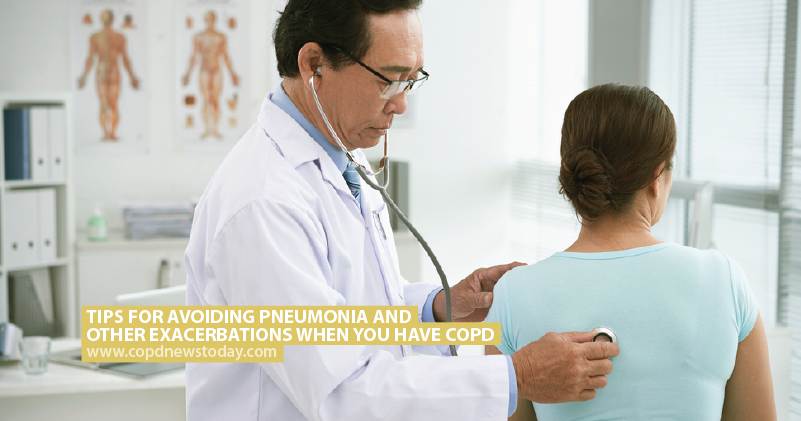Tips for Avoiding Pneumonia and Other Exacerbations When You Have COPD
Written by |

Having a chronic lung condition such as chronic obstructive pulmonary disease (COPD) can make you more susceptible to dangerous lung infections like pneumonia. However, according to the COPD Foundation, there are ways you can avoid developing pneumonia and other exacerbations.
MORE: 10 questions for your doctor or nurse about COPD
What is pneumonia?
Pneumonia is an infection that can occur in one or both lungs. It can be caused by bacteria or viruses and in rare cases, certain fungi which are transferred by touch or by breathing droplets in the air. The organisms settle in the air sacs within the lungs and turn to fluid or pus as the immune system tries to rid the lungs of the infection.
Pneumonia mainly affects young children, smokers, adults over the age of 65 and people with lung conditions such as COPD. Along with the flu, pneumonia is the eighth leading cause of death in the U.S.
The infection can be caused by other illnesses such as flu, measles, pneumococcus, whooping cough and Haemophilus influenzae type b (Hib).
Symptoms of pneumonia
Symptoms of pneumonia can often be mistaken for a COPD exacerbation, which makes it extremely important to contact your healthcare team if you experience any of the following symptoms:
- Fever or shaking chills
- Rapid breathing or shortness of breath more severe than usual
- Excess coughing producing lots of mucus
- Change in color of mucus (usually green, yellow, tan or bloody)
- Increased heart rate
- Pain in a specific area (or areas) of the chest when deep breathing
- Nausea or vomiting
- Diarrhea
Ways to avoid pneumonia and other exacerbations
Recognizing the early warning signs of pneumonia or another COPD exacerbation are key to quickly treating pneumonia, but there are ways that you can try to avoid the infection, including:
- Keeping up with appointments with your healthcare team, even if you feel well
- Having flu and pneumonia vaccinations annually
- Regularly washing your hands, particularly after touching items other people may have handled
- Carrying a bottle of hand sanitizer around for when you’re somewhere without washrooms
- Avoiding touching your mouth, nose and eyes
- Carrying your own pen so you don’t need to use other people’s
- Avoiding large crowds during cold and flu season
- Avoiding people who are ill
- Quitting smoking
- Eating a healthy, balanced diet
- Getting plenty of sleep
MORE: What to know if you’ve just been diagnosed with COPD
COPD News Today is strictly a news and information website about the disease. It does not provide medical advice, diagnosis or treatment. This content is not intended to be a substitute for professional medical advice, diagnosis, or treatment. Always seek the advice of your physician or another qualified health provider with any questions you may have regarding a medical condition. Never disregard professional medical advice or delay in seeking it because of something you have read on this website.




